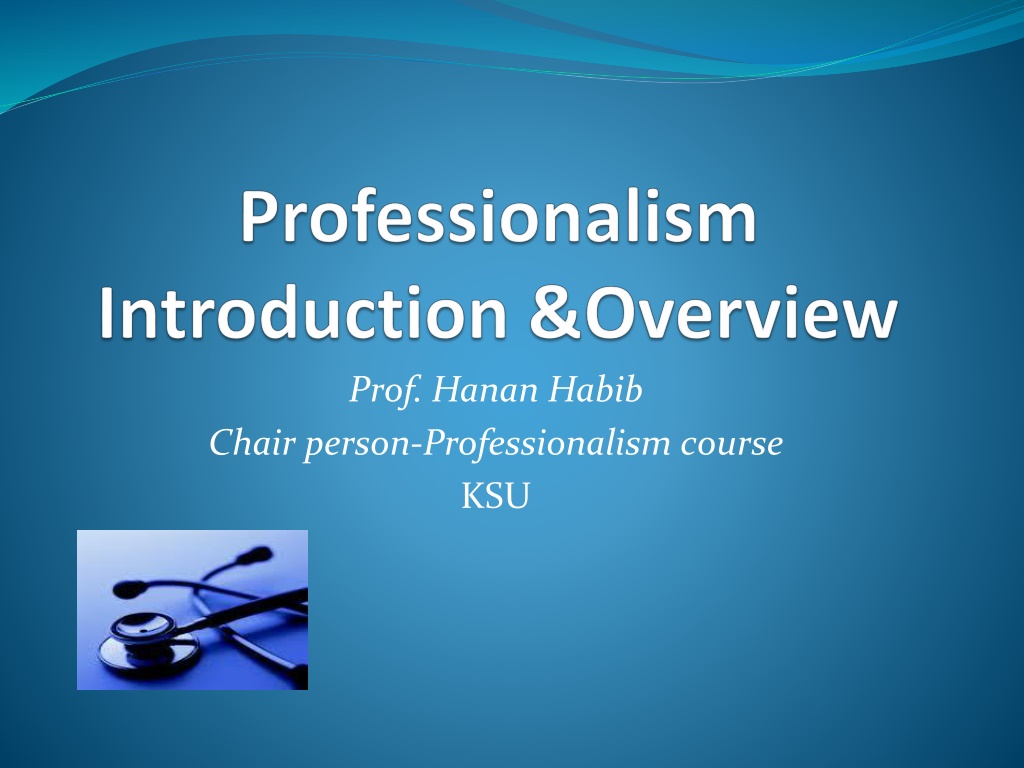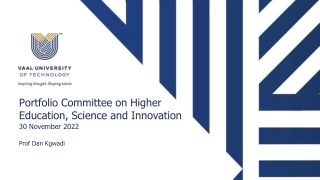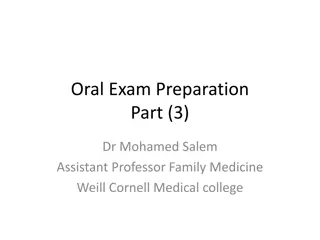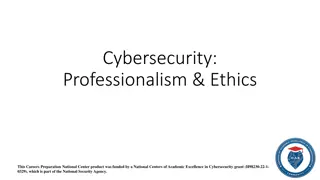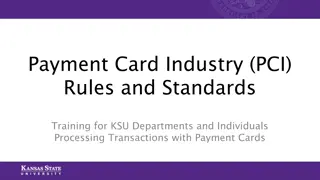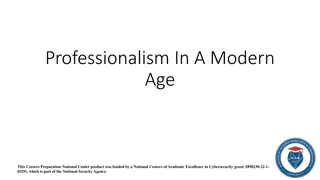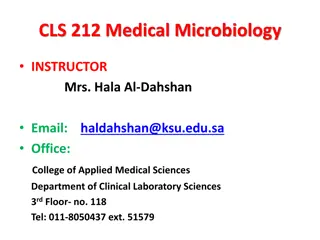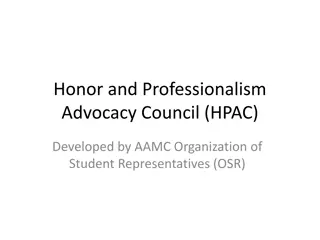Professionalism Course Overview at KSU: Prof. Hanan Habib, Chairperson
This professional course at KSU, led by Prof. Hanan Habib, aims to instill key attributes of professionalism in second-year medical students. The curriculum covers various aspects such as medical professionalism, evolution of standards, Islamic values, and more. The teaching strategy involves interactive lectures with case scenarios, fostering active student participation. Continuous evaluation through short answer questions ensures a comprehensive understanding of the course material.
Download Presentation

Please find below an Image/Link to download the presentation.
The content on the website is provided AS IS for your information and personal use only. It may not be sold, licensed, or shared on other websites without obtaining consent from the author. Download presentation by click this link. If you encounter any issues during the download, it is possible that the publisher has removed the file from their server.
E N D
Presentation Transcript
Prof. Hanan Habib Chair person-Professionalism course KSU http://t0.gstatic.com/images?q=tbn:FIVwsAhe4GONCM:http://blogs.seattleweekly.com/dailyweekly/stethoscope.jpg
Professionalism course Course title : Professionalism Code & number : SKLL 221 Target : Second year medical students Course duration : One year Credit hours : 6 credit hours
Professionalism course Faculty and Committee Chair person : Prof. Hanan Habib Co-chair : Dr. Kamran Sattar Committee & Members : Prof. Ahmad Adeel Dr. Hala Kfoury Dr. Ali Mohmad
Contents Objectives of the course Contents of the course Teaching strategy and course evaluation Overview about professionalism Referenced books.
Objectives of the course Inspiration : To grasp the professionalism concept by students. Motivation : To motivate students into acquiring and understanding the values and attributes related to professionalism. Guidance : To guide students into acting and behaving along the guidelines of professionalism. Refinement : To refine the different skills and reach the highest standards of professionalism.
Course Contents key elements of profession & professionalism. Medical professionalism attributes. Evolution of professional standards. Islamic values and professionalism. Professional medical student. Unprofessional behaviors. Professionalism in different cultural contexts. The role of national medical bodies. Psychology in physical illness. Communication skills. Consultation skills. Inter-professional relationship Legal aspect of medical practice.
Teaching Strategy Lectures Interactive lectures ( integrated with all four blocks) . Each lecture has theoretical part and case scenarios. Students full involvement in the discussion.
Evaluation (continuous exam) During the lecture , students will be given four short answer questions based on the current lecture ( MCQs or short answer ). Every student has to write answers for these four questions. Each question carries one mark. A total of 40 marks
End of year examination End of academic year there will be an exam consisting of 40-60 MCQs. A total of 100 marks.
Islamic Medicine The holy Qura anand Al-Hadith have stated that Muslims has duty to care for the sick and this often referred to Medicine of Prophet . According to the sayings of the Prophet Mohamed peace be upon him that Allah has sent a cure for aliment and that it was the duty of Muslim to care of the body and spirit. This includes improving the quality of care and ensures access of healthcare to every body.
Islamic Physicians Many have made outstanding discoveries in all aspects of medicine during the Islamic golden age. Examples: AL-RAZI-produced over 200 books about medicine and philosophy. IBN-SINA- the true polymath excelled in many academic fields including Islamic medicine philosophy, and natural sciences. AL-KINDY- medical formulary. IBN-AL-NAFES- first to understands cardio- respiratory system.
Professionalism course Why professionalism is important? There is a great increase in interest in developing medical professionalism of the students. The ethical demands upon medical profession have increased due to changes in the traditional modes of health care delivery, increased complexity in the methods of reimbursement, and developing national trends toward managed care. Medical professionalism sets out three principles: ethical principles, knowledge and skills & selflessness
Continue- Most people desire to be treated by physicians who, in addition to being competent ,care deeply about their patients. Professionalism and humanism sometimes confused as being synonymous. Professionalism denotes a way of behaving in accordance to certain normative values. Being productive Effective management of relationships Being ambassador Being mission-minded
Referenced Books Feldman MD, Christensen JF( 2007). Behavioural medicine. a guide for clinical practice. McGraw Hill Lang, UK. Stern DT (2005). Measuring medical professionalism. Oxford University Press,UK. Spandorfer J, Pohl CA, Rattner SL, NascaTJ (2010). Professionalism in medicine. A case-based guide for medical students. Cambridge University Press. UK
